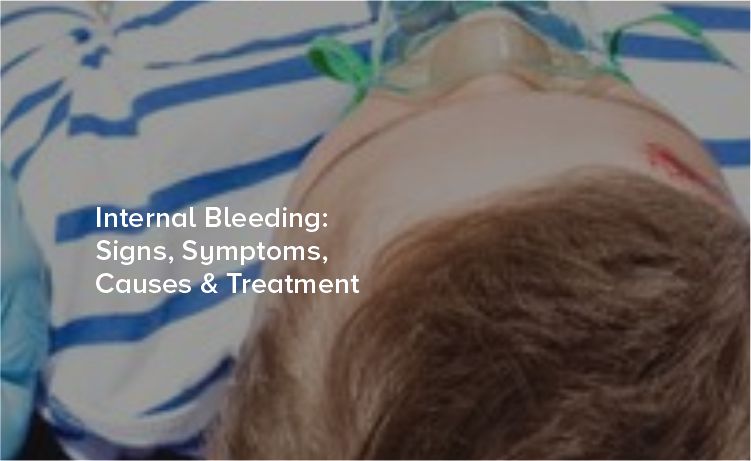
Internal Bleeding: Signs, Symptoms, Causes, & Treatment
Internal bleeding, a condition that occurs inside the body when blood leaks from blood vessels or organs, remains one of the most insidious medical concerns due to its often-hidden nature. Unlike external bleeding, which is visible and can be treated more straightforwardly, internal bleeding requires a keen eye on symptoms and an understanding of its root causes for timely intervention.
Understanding Internal Bleeding
Internal bleeding happens when blood escapes the circulatory system, collecting inside the body. The severity can range widely – from a minor leakage that the body can repair on its own to a life-threatening emergency requiring immediate medical attention.
Signs and Symptoms
The symptoms of internal bleeding can be subtle or pronounced, depending on the location and extent of blood loss. General signs include:
- Fatigue and Weakness: Often a result of the body's overall response to blood loss.
- Pale or clammy skin: Indicates the body's efforts to maintain blood flow to vital organs.
- Abdominal pain and swelling: May suggest bleeding in abdominal organs, such as the liver or spleen.
- Shortness of breath or dizziness: Symptoms that often result from decreased oxygen delivery due to blood loss.
- Blood in urine or stool: Indicates possible bleeding in the urinary tract or gastrointestinal tract, respectively.
- Nausea and vomiting: Especially if the vomit resembles coffee grounds – a sign of digested blood.
It's crucial to recognize that symptoms can vary based on the bleeding's specific location. For instance, bleeding in the brain may cause headaches, seizures, or changes in consciousness.
Causes of Internal Bleeding
Factors leading to internal bleeding encompass a broad range of health issues and scenarios, including:
- Trauma: Such as car accidents or falls, causing blood vessels to burst or organs to be injured.
- Medications: Blood thinners and non-steroidal anti-inflammatory drugs can increase bleeding risks.
- Medical conditions: Diseases like ulcers, hemorrhoids, ectopic pregnancies, and cancers can cause internal bleeding.
- Surgical complications: Occasionally, surgery can sometimes lead to unintended internal bleeding.
Diagnosing Internal Bleeding
Timely diagnosis involves a combination of patient history, physical examinations, and specific diagnostic tests. These can include:
- Blood tests: To assess red blood cell count, clotting function, and organ health.
- Imaging studies: Ultrasounds, CT scans, and MRIs can pinpoint bleeding sources and help evaluate its extent.
- Endoscopy: For gastrointestinal bleeding, a camera-enabled device examines the internal lining of the digestive tract.
Treatment Options
The treatment for internal bleeding depends heavily on its cause, location, and severity. Treatment strategies may involve:
- Medication: To address underlying issues like blood-clotting disorders or to reverse the effects of blood thinners.
- Surgery: To repair damaged vessels or organs, sometimes involving minimally invasive techniques such as laparoscopy.
- Blood transfusions: To replenish lost blood volume and maintain the body’s ability to transport oxygen.
- Monitoring and supportive care: In cases where the body can heal on its own, medical professionals might opt for observation and support.
Preventive Measures
While not all instances of internal bleeding are preventable, certain lifestyle modifications and medical attentiveness can reduce risks:
- Routine check-ups: Regularly consulting with healthcare providers can help manage chronic conditions that might lead to internal bleeding.
- Medication management: Discussing potential side effects of medications with a healthcare provider, especially concerning blood thinners and NSAIDs.
- Injury prevention: Adhering to safety measures in sports and wearing seatbelts can mitigate the risk of trauma-induced internal bleeding.
Conclusion
Internal bleeding remains a complex medical condition that calls for vigilance in recognizing symptoms, understanding potential causes, and seeking proper medical care. Through heightened awareness and education, individuals can better equip themselves to respond promptly to this hidden danger, potentially saving lives and preserving health. Always consult healthcare providers immediately if you suspect internal bleeding or experience any alarming symptoms. Citizens Specialty Hospital is the best hospital for critical care in Hyderabad.

Author Bio
Dr A Praveen
Medical Oncology
medical oncologists in American Oncology Institute in Gurugram
Dr (Brig) Anil Kumar Dhar is one of the top medical oncologists in Gurugram. He has a vast experience of more than 30 years in the field of Medical oncology. He his specialised in treating leukemia,lymphoma, hematological oncology and other complex oncology cases . He is also specialised in Bone Marrow Transplantation (BMT) treatment. He is working as a Senior Consultant, HOD, Medical Oncologist in American Oncology Institute, Gurugram.
